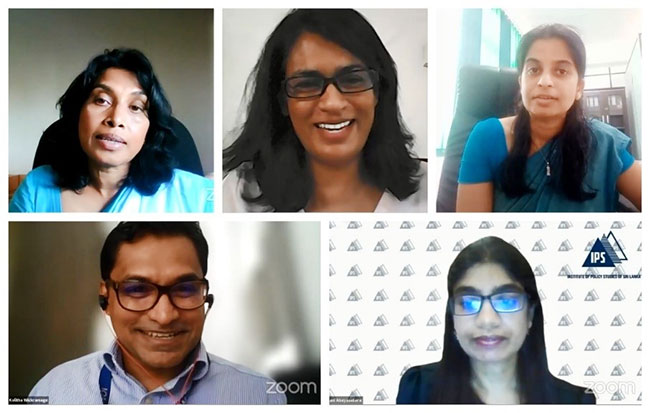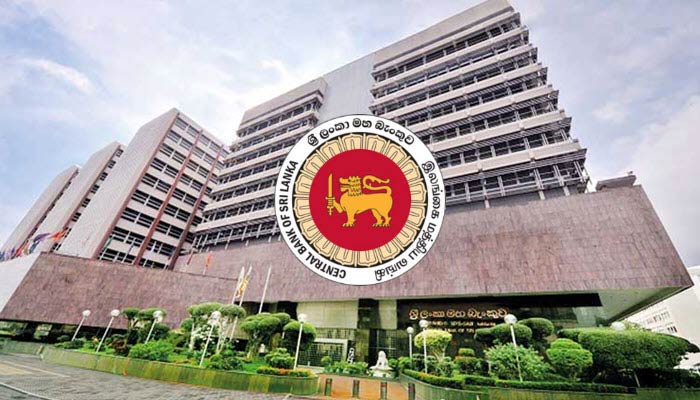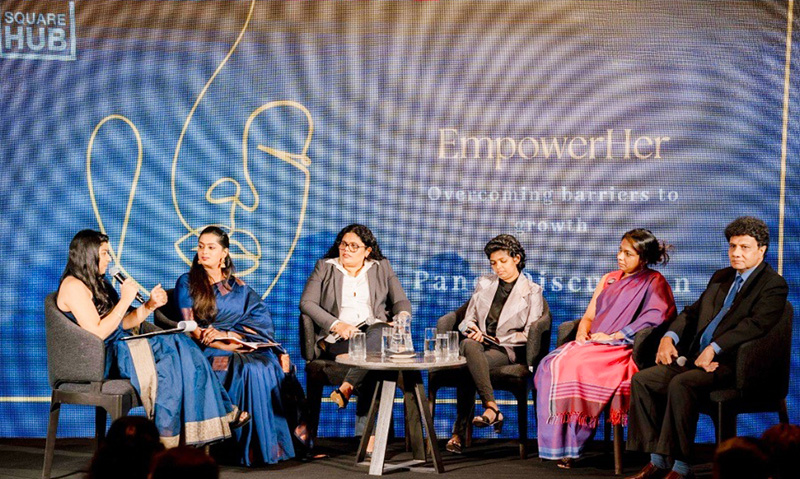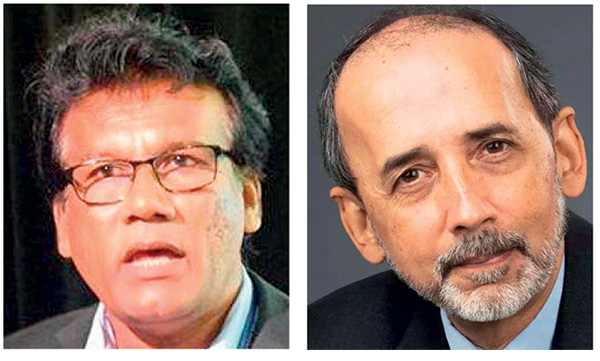Business
Safeguarding lives and livelihood of Sri Lankans

Pandemics and Disruptions:
by Suresh Ranasinghe
The impact of COVID-19 on Sri Lanka’s labour market, education, migration, and health sectors were discussed at the second webinar panel discussion held on October 13, to mark the release of the ‘Sri Lanka: State of the Economy 2021’ report, the flagship report of the Institute of Policy Studies of Sri Lanka (IPS).
The event saw presentations by Dr Nisha Arunatilake and Dr Bilesha Weeraratne from IPS, with expert insights from Ms Madhavie Gunawardena, Director of TRCSL and Former Commissioner of Labour and Dr Kolitha Wickramage, Global Migration Health Research and Epidemiology Coordinator, Migration Health Division, International Organization for Migration (IOM). Ashani Abayasekera from IPS moderated the discussion.
Key highlights of the discussion are presented in this blog.
Presentation: Labour Markets and Education
Dr Nisha Arunatilake
An estimated 225 million people lost their jobs globally in 2020 due to COVID-19, according to the International Labour Organization (ILO). Sri Lanka’s labour market was also severely affected, with 150,000 people losing jobs and the quality of available jobs deteriorated with many workers taking on more vulnerable forms of employment (eg. agriculture, self-employment) that have low social security. The unemployment rate rose by 0.7% in 2020. The most affected were youth, low and medium-skilled individuals, and males, while several women left the labour market altogether.
The pandemic affected different types of workers differently. Frontline workers were the most vulnerable, and a large share of frontline workers are females. The ILO has classified industries according to their COVID-19-related economic output risk. This calculation was used to see how COVID-19 has affected different types of workers, and it shows that 39% of workers are in high-risk industries in Sri Lanka. Further, medium-skilled workers and women are more likely to be in high-risk industries.
The government took various measures to provide relief to workers, but the relief packages were given is not as sizeable as the types of relief provided in other countries. IPS research shows that the perception of employees, employers, and trade union leaders is that the government could have done better by providing financial support through the EPF/ETF funds, as done in other countries like India.
 The pandemic has highlighted the importance of providing pre-retirement social protection such as unemployment benefits and wage support during illnesses in addition to current post-retirement social protection measures. Therefore, it is necessary to create a separate fund to provide pre-retirement social protection as practised in Nepal, Malaysia, and Singapore.
The pandemic has highlighted the importance of providing pre-retirement social protection such as unemployment benefits and wage support during illnesses in addition to current post-retirement social protection measures. Therefore, it is necessary to create a separate fund to provide pre-retirement social protection as practised in Nepal, Malaysia, and Singapore.
A recent IPS study finds that, Sri Lanka’s ETF funds are sufficient to cover sickness and unemployment benefits to workers and provide wage support to retain jobs. In summary, the government must improve and expand access to social security for employees and firms, support firms to offer flexible work arrangements for higher labour participation and develop better labour market institutions that have the capacity to collect timely data and are prepared to address disaster risks.
Since March 2020, schools across Sri Lanka were closed other than for few brief periods of operation and the total number of school days missed are significantly higher in Sri Lanka compared to other countries. Even though the Ministry of Education and associated organisations provided lessons online and via TV, less than 50% of the students were reached online and in smaller schools, only 30% were reached by both online and TV. There needs to be an assessment done about the learning losses, and adjust the curricular, so that schools can focus on the most needed competencies to streamline and speed up the recovery.
Migration and Health
Dr Bilesha Weeraratne
A large number of migrant workers were forced to return much earlier than they planned due to the pandemic, and it affected earnings and their capacity to return. Notably, most of the returnees were either self-financed or their employer paid for their return air ticket. Limitations in Sri Lanka’s return and repatriation efforts were not able to bring a wide cross-section of returnees back to Sri Lanka from the onset itself. On average, there was a 4.5-month delay between the decision to return and the actual date of return. This was also because of the lack of proper information. Sri Lanka has a return and reintegration sub policy, and the issue was that it was not implemented.
Returning migrant workers require economic, social and psychosocial reintegration support but reintegration support was largely limited to immediate health support (testing, quarantine, treatment). Also, issues associated with the vaccination process in Sri Lanka such as irregular and inconsistent supply, delays in NMRA approvals, disorganised deployment etc. caused the delays in vaccinating potential migrant workers as well. However, the vaccination process for migrant workers was much better organised than the overall vaccination process in the country.
Sri Lanka sends 225,000 workers abroad while foreign annual exchange earnings is USD7 billion. Although in 2020 there were just 53,713 registered departures, remittances increased grew by 5.8%. They began declining since the beginning of 2021. There were many reasons for the growth last year like informal remittance channels being closed due to the lockdown and workers increasing their remittances through formal channels. Further, workers who were terminated would have got lump sums as terminal benefits which were remitted, while another reason would have been the reluctance of returnees to carry cash as they had to be quarantined on arrival.
Commentary: Labour Markets and Education
Ms Madhavie Gunawardena
The COVID-19 pandemic has flagged the need for Sri Lanka to revisit its labour laws and regulations. Since the labour market was forced to accept work from home (WFH), accommodating flexibility in labour legislation and other legislation governing the workplace is essential. Accommodating flexible working practices is important, especially for women, as this allows them to balance their family and work responsibilities, thus retaining them in the labour force. With prolonged school closures, there is currently no way of improving the students’ soft skills as extra-curricular and co-curricular activities were halted. This will affect their employability in the future.
Commentary: Migration and Health
Dr Kolitha Wickramage
In the migration sector, future policy decisions should take into consideration factors such as the gender dimension of returnees and skills requirements of migrant workers as well. Psychosocial health and mental health are extremely important for the reintegration package since this is still an unmet agenda. Even though the overall vaccination process including vaccination for migrant workers in Sri Lanka is appreciable, the number of deaths and serious cases can be averted if a more systematic strategy such as those provided by WHO Sage recommendations were followed. The IPS State of the Economy report must be commended for recognising the need to address psychosocial issues of migrants, in addition to their social and economic issues.
Business
Relief measures to assist affected Small and Medium Enterprises

As agreed with the Sri Lanka Banks’ Association (Guarantee) Ltd. (SLBA), to provide relief measures to affected SMEs by licensed commercial banks and licensed specialised banks, Circular No. 04 of 2024 dated 19.12.2024, and its addendum, Circular No. 01 of 2025 dated 01.01.2025 were issued by the Central Bank of Sri Lanka to ensure the effective implementation of the relief measures specified in the cited Circulars in a consistent manner across all licensed banks.
In case of any rejections or disputes, borrowers are requested to contact the respective banks and to appeal to the Director, Financial Consumer Relations Department of CBSL (FCRD), if required through the following channels:
Based on the repayment capacity and the submission of an acceptable business revival plan by the borrower, the relief measures extended to affected SMEs include rescheduling of credit facilities up to a period of 10 years, extending the time to commence repayments based on the capital outstanding, waiving off unpaid interest subject to conditions, and providing new working capital loans. Despite the availability of the above relief measures, limited number of borrowers had approached licensed banks to avail themselves of these benefits to date.
In addition to the above measures, with the gradual recovery of the economy, in order to facilitate the sustainable revival of businesses that were adversely affected during the recent past, several other measures were taken by CBSL together with the banking industry.
Accordingly, inter alia, strengthening the Post Covid 19 revival units of licensed banks, CBSL issued Circular No. 02 of 2024 dated 28.03.2024 on “Guidelines for the Establishment of Business Revival Units of Licensed Banks” mandating banks to establish Business Revival Units (BRUs) to assist viable businesses that are facing financial and operational difficulties.
Under BRUs, banks may provide support to viable businesses, such as restructuring and rescheduling of credit facilities including the adjustment of interest rates, maturity extensions, providing interim financing, advisory services etc., subject to the condition that such borrowers are required to submit acceptable business plans and feasible repayment plans. As reported by banks, by the end of 2024, around 6,000 facilities had been facilitated through these BRUs.
The above cited Circulars and Guidelines can be accessed via https://www.cbsl.gov.lk
Business
Visa commits to support women entrepreneurs in Sri Lanka

Visa (NYSE: V), the global leader in digital payments reiterated its support to women entrepreneurs across Sri Lanka as a part of its International Women’s Month celebrations across the world, by stating a firm commitment towards financial inclusion and digitization of women-led businesses, and hosted women from different walks of life in a specially curated event at Colombo.
Avanthi Colombage, Country Manager for Visa in Sri Lanka and Maldives stated, “At Visa, we believe in being the best way to pay and be paid by uplifting everyone, everywhere. This year, we celebrated International Women’s Month to support the very capable businesswomen in our country, with an event titled ‘Overcoming Barriers to Growth’ along with Square Hub, an incubator and business accelerator.”
The event by Visa brought together 35 upcoming women entrepreneurs across various sectors, including fashion, e-commerce, fintech, technology, manufacturing, and agriculture. While prominent industry experts shared views, learnings and experiences from their own journeys, the event also facilitated open discussions and networking among entrepreneurs, on how they can build and sustain thriving businesses.
Avanthi elaborates that Visa has built a firm foundation in supporting female entrepreneurship and the empowerment of women in Sri Lanka and understands the challenges women-owned businesses face when seeking capital, access, networks and guidance and continues to actively uplift women in Sri Lanka. Globally and in Sri Lanka, Visa believes that the participation of women is key to the growth of an economy. Avanthi adds, “Two years ago, when we celebrated 35 years of Visa in Sri Lanka, we announced a grant for The Asia Foundation to assist women-led small and medium businesses (SMBs) throughout the country. This initiative offered vital seed funding, skills training, and financial inclusion opportunities for women entrepreneurs, helping remove some major barriers to their success,” she recalled.
Business
Environmentalists renew concerns over Adani Group’s proposed Mannar wind power project

Environmental groups, including the Wildlife and Nature Protection Society (WNPS), the Centre for Environmental Justice (CEJ) and the Environmental Foundation Ltd. (EFL), are raising renewed concerns about the potential ecological impact of large-scale wind energy development on Mannar Island. Conservationists argue that the island, home to a unique and sensitive ecosystem, faces serious risks from industrial projects that may disrupt biodiversity and endanger local wildlife.
At the heart of the controversy is whether the environmental issues raised by Adani Group’s proposed wind energy project in Mannar were being adequately considered. Critics argue that tariff negotiations and economic interests overshadowed ecological assessments, potentially leading to a project that might compromise the island’s rich natural heritage.
“Can wind energy coexist with Mannar Island’s fragile ecosystem? asked environmental scientist Hemantha Withanage of the CEJ.
He told The Island Financial Review: “We must ensure that our transition to renewable energy does not come at the cost of irreplaceable biodiversity.”
Other conservationists have pointed out that environmentalists are often misrepresented as obstructionists in debates over development. “Are we being painted as enemies of progress, or is the public being misled about the real consequences of such projects? questioned Dr. Rohan Pethiyagoda, a leading environmental advocate.
With Adani’s possible withdrawal from the project, there is now an opportunity to reevaluate Sri Lanka’s approach to sustainable energy. Experts emphasize the need for a smarter, science-driven path that prioritizes both renewable energy and environmental conservation.
A joint media conference, scheduled for today at the Dutch Burgher Union, Colombo, aims to address these concerns. Organized by WNPS, CEJ, EFL and Pethiyagoda, the event will explore questions such as whether the project might resurface under a new guise and who the true beneficiaries of such large-scale energy initiatives are.
By Ifham Nizam
-

 Sports4 days ago
Sports4 days agoSri Lanka’s eternal search for the elusive all-rounder
-

 News3 days ago
News3 days agoBid to include genocide allegation against Sri Lanka in Canada’s school curriculum thwarted
-

 News5 days ago
News5 days agoGnanasara Thera urged to reveal masterminds behind Easter Sunday terror attacks
-

 Business6 days ago
Business6 days agoAIA Higher Education Scholarships Programme celebrating 30-year journey
-

 News4 days ago
News4 days agoComBank crowned Global Finance Best SME Bank in Sri Lanka for 3rd successive year
-

 Features4 days ago
Features4 days agoSanctions by The Unpunished
-

 Latest News2 days ago
Latest News2 days agoIPL 2025: Rookies Ashwani and Rickelton lead Mumbai Indians to first win
-

 Features4 days ago
Features4 days agoMore parliamentary giants I was privileged to know











